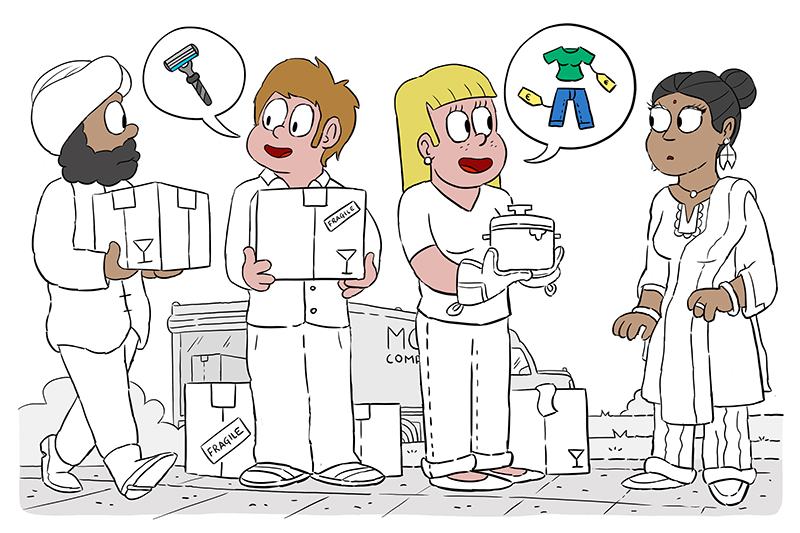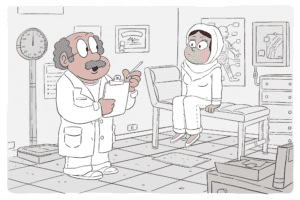
Aarav and Diya have become status holders. They moved into a new home with their infant daughter and Aarav started a store. They are getting in touch with their new neighbors Kees and Annie. They seem to be friendly neighbors, but communication is difficult.
But a few days later Aarav came home from his store angry. Kees had stopped by and told him to shave off his beard! And the next day Annie said to Diya out of the blue that she stood out so much in her sari. Diya explained why these clothes fit her and her faith, but Annie shrugged her shoulders! Diya is still indignant! “I feel offended by those people and prefer to keep some distance,” she said.
Annie just wanted to help. “We have new neighbors from India and we wanted to help them integrate into Holland,” she said. They had helped move in that first day and it was very pleasant! The new neighbor, Aarav, has opened a store but with that black beard of his he might scare customers away. Kees wanted to help him by kindly explaining that to him. “And I told Diya that if she adjusts her clothes a bit, she will be better accepted in the neighborhood. But she thinks her religion is more important and then how can they integrate?”
Where is the connection?
Kees and Annie want to help by explaining how things work in the Netherlands. They have no idea that their comments could be taken as insulting and even discriminatory by Aarav and Diya.
Most Dutch people generally have a direct way of communicating and clearly saying things. They often go quite far with good intentions and then they run the risk of hurting people from different or bi-cultural backgrounds. Some Dutch people also feel that immigrants could do a better job of adapting.”
Aarav and Diya face a very different communication style than they are used to. They come from a we culture, while Kees and Annie come from an I culture. For Kees and Annie it is important to be open and honest, they use a direct way of speaking. If the other person disagrees they hear it. They want to be friendly neighbors.
In India, people speak much more indirectly. Indians involve so much more in speaking. Body language, silences and all kinds of by words like, a little, maybe. We call those “downgraders. Words and gestures that weaken. That help say something with a detour. In Dutch there are not so many opportunities to weaken, it also doesn’t suit our way of speaking. Rather, we use reinforcing words. Annie will have added “do you understand?” to her comment. Or “sure” and “I think. And then look directly at Diya, who then doesn’t know where to look.” To which Annie thinks she won’t listen, isn’t interested. Like it or not.
Aarav and Diya can respond to Kees and Annie’s comments in different ways. They may seriously consider the advice, Kees and Annie are apparently talking about something they think is important. Maybe they are friendly neighbors after all.
Kees and Annie would like to help, but they can also do so indirectly, by asking questions about the beard. How long have you had it? Do many people in India wear a beard? Aarav and Diya have grown up with indirect communication and reading between the lines. They do draw their conclusions.
But the best thing to do is to leave this kind of matter alone. No one has the right to address the other person on appearance. That feels discriminatory, or worse: racist. If Aarav feels his beard gets in the way of success, he can always think about that. Kees doesn’t have to feel responsible for that.
In short
For Kees and Annie:
- Accept that Aarav and Diya come from we-culture.
- Aarav and Diya are not likely to show what they really think. Watch for other signs in their communication.
- Create the opportunity to make something clear and do so incrementally if it is a personal topic.
- Weakening words can help with that.
For Aarav and Diya:
- Accept that you live in a very strong I culture.
- That the heart is on the tongue and that the Dutch address you directly and give their opinion.
- Above all, ask your questions and express your surprise.
- Disagreeing and letting it be known is normal.
- It is not bad to use words that emphasize precisely what you are saying.
Important to know
The story is based on stories shared with us. Connect2Us strives to highlight the story from both sides and not to label people or suggest that one or the other should behave differently. We see in our daily intercultural work that awareness is enough for those involved to move toward each other without denying themselves. Connect2Us focuses on prejudice. Read about prejudice, discrimination and racism here.

